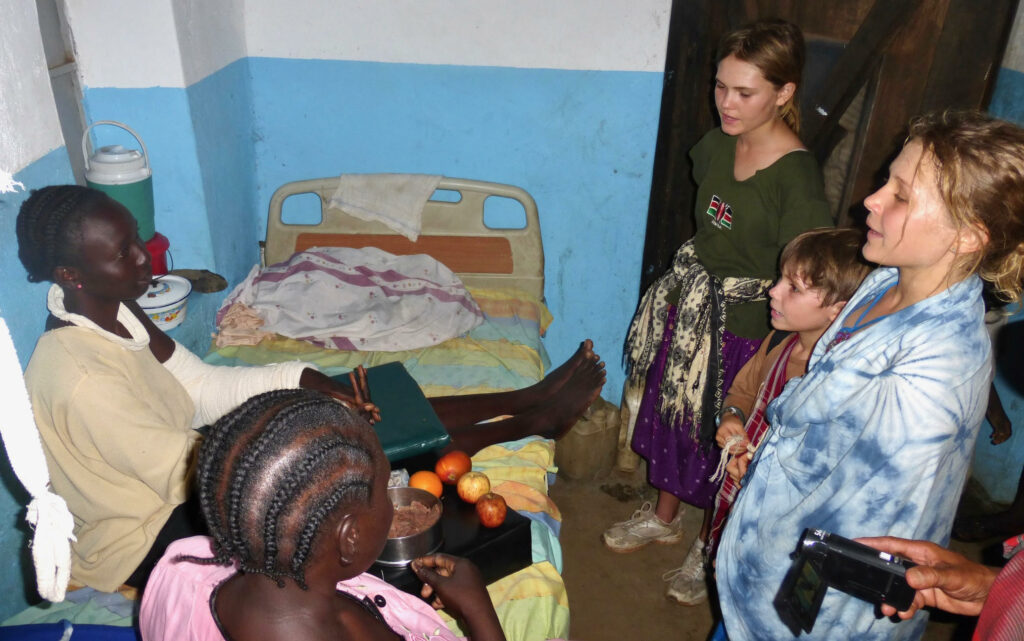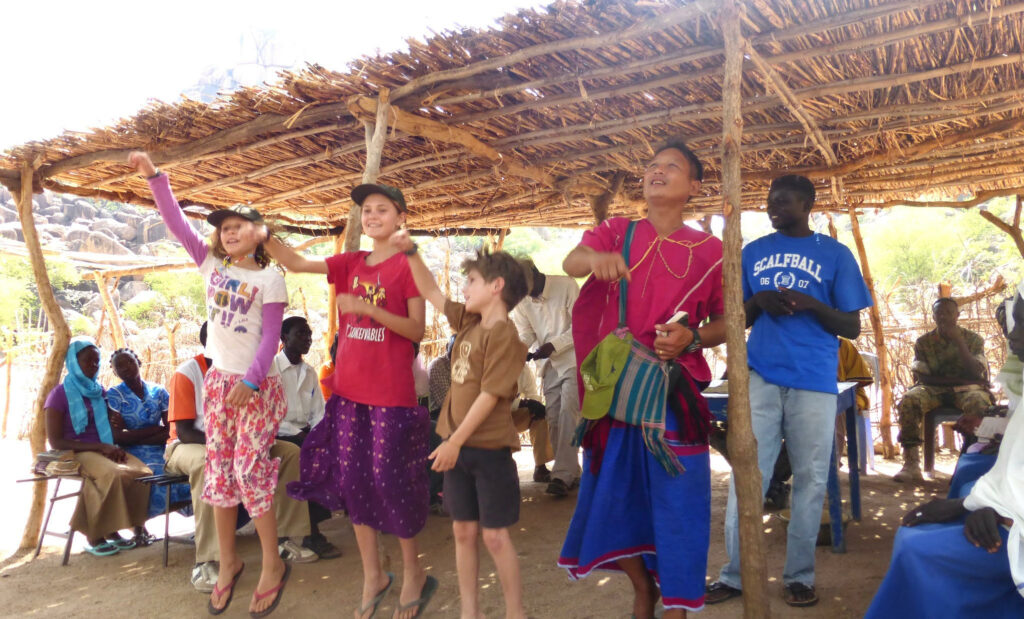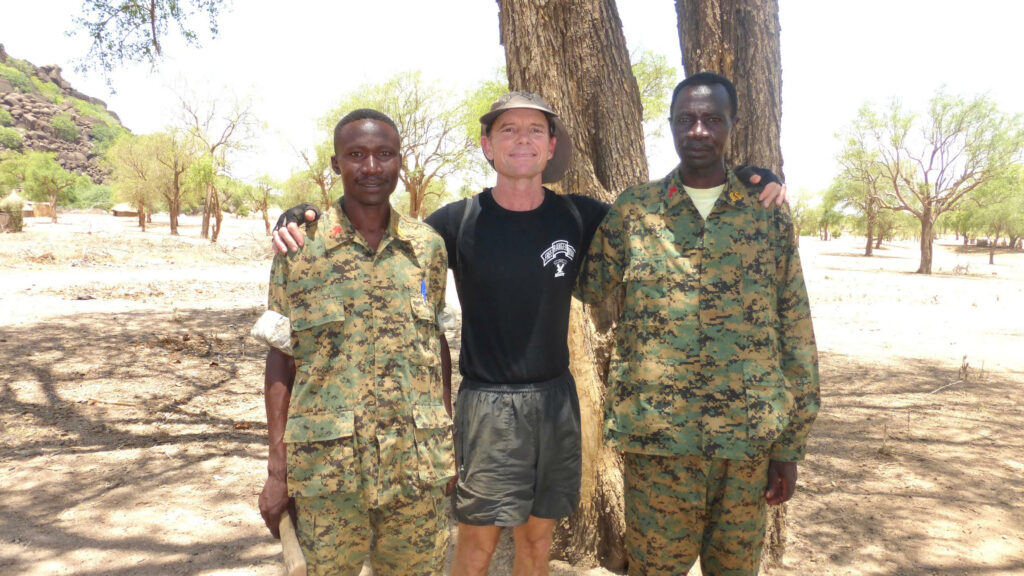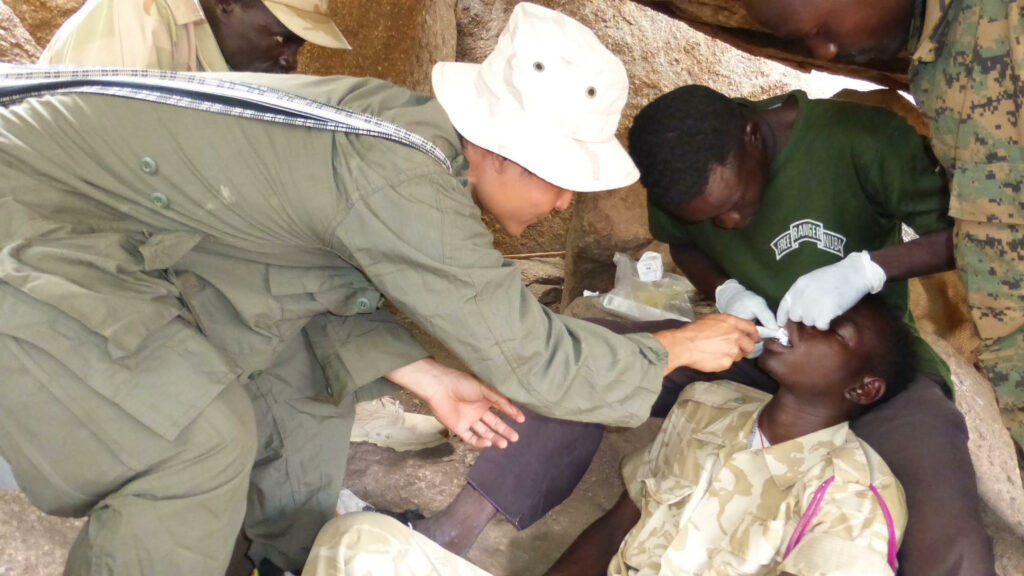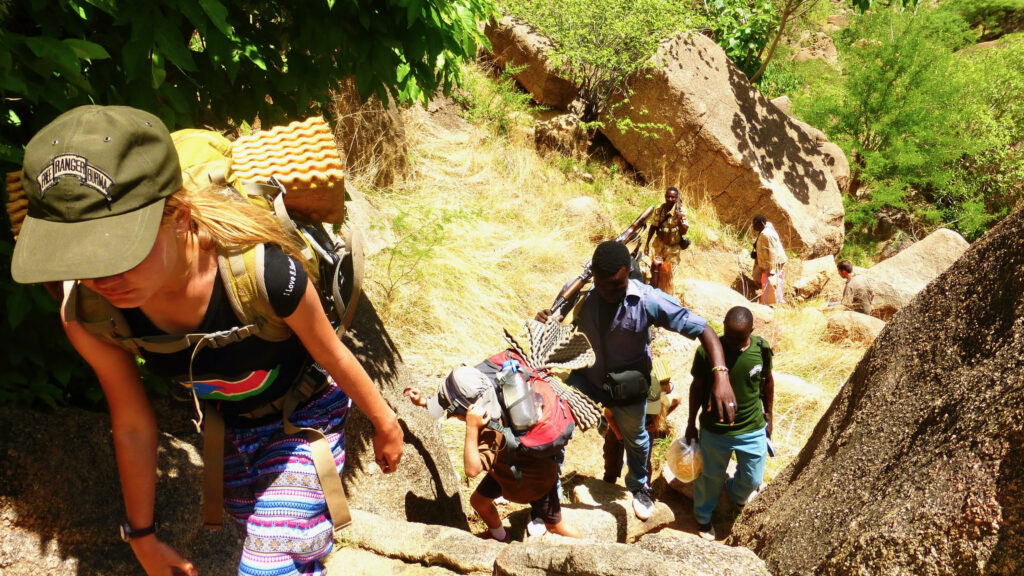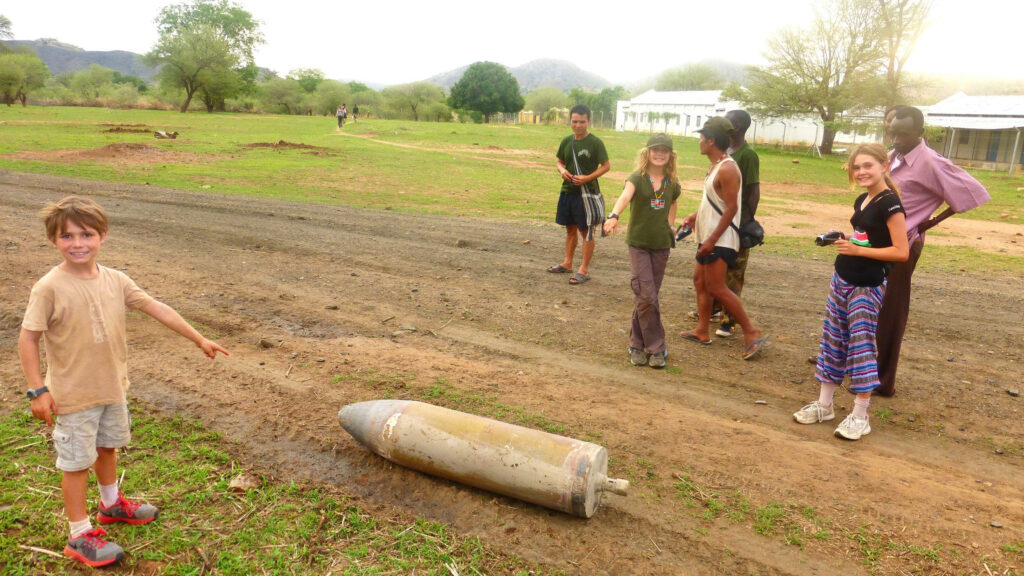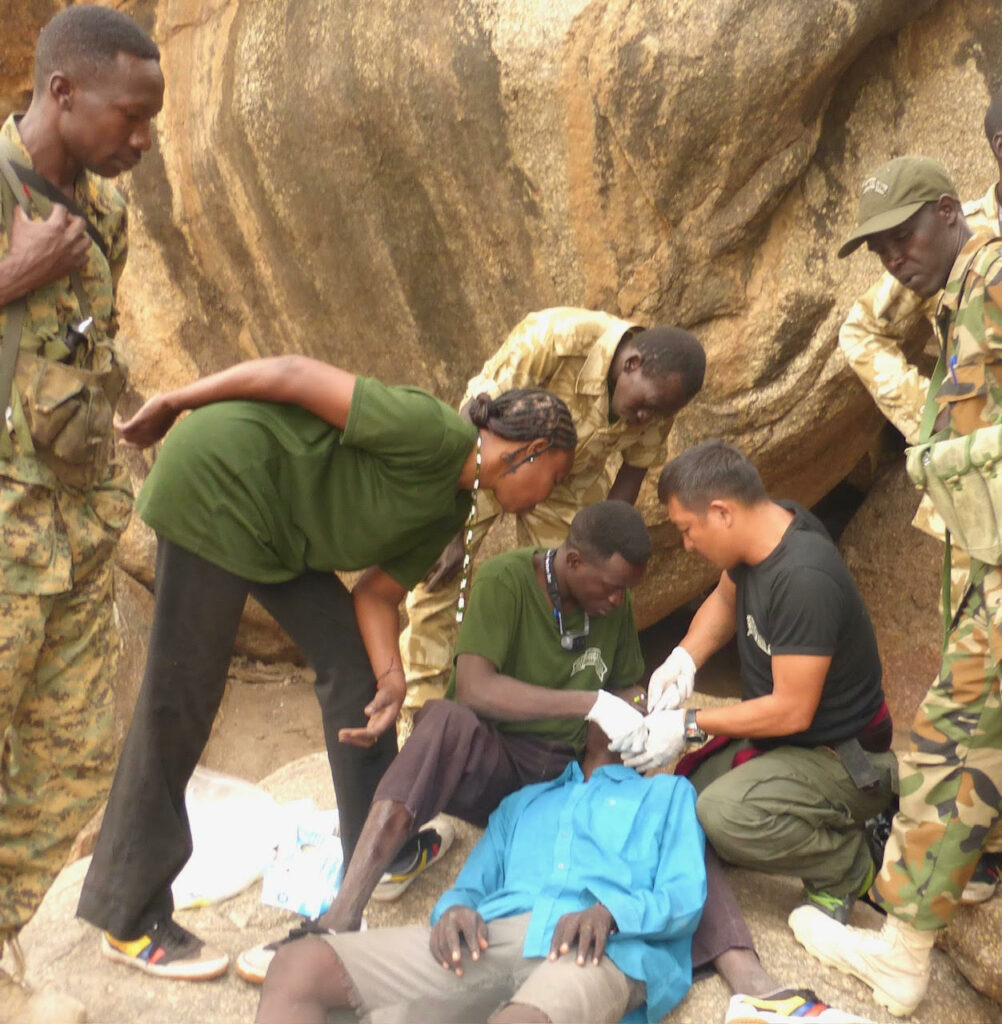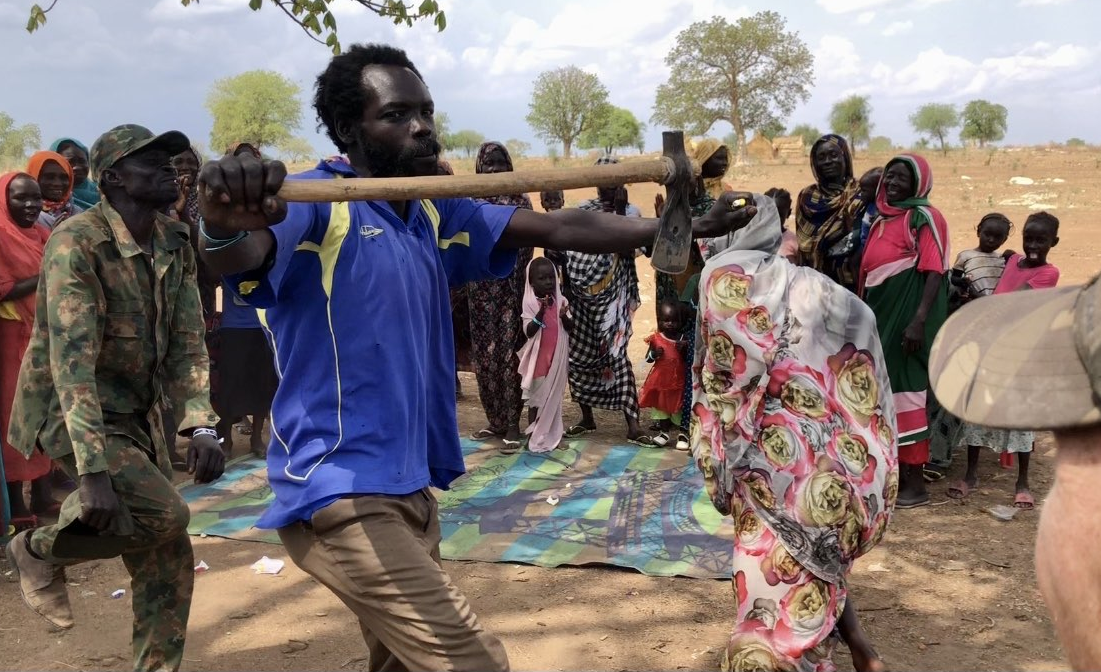22 July 2025
Nuba Mountains, Sudan
Dear friends,
Today Sudan is enduring what many call the world’s worst humanitarian crisis. Since 2023, a brutal civil war has been ignited between rival military factions, tearing Sudan apart at the seams. 1Roughly 14.5 million people have been displaced as a result. Roughly 10.5 million of those people have been displaced internally, and four million to neighboring countries such as Egypt, South Sudan, Chad, Ethiopia, Libya and the Central African Republic. 2More than 50% of Sudanese are considered to be at a “crisis” level of food insecurity, with a further 33% whose food supply is considered “stressed” meaning more than 80% of Sudanese are experiencing some form of food insecurity, including more than 600,000 people suffering famine conditions. Outbreaks of diseases such as cholera, malaria, and measles are sweeping through the displaced people with terrifying speed. Mass rape and killings of civilians have become weapons of war, shattering communities, and leaving a generation traumatized. Entire towns lie in ashes, and any hope for peace feels far away.
Yet there is a place that still stands: The Nuba Mountains of the south. Distinct in language, culture, and faith, the Nuba people have long stood apart from the rest of Sudan. They are a mostly African people who are a mix of Christians, Muslims, and Animists who have managed to live together with some unity, and who, for decades have resisted forced Arab-Islamic rule from Khartoum. In this latest war, their mountain strongholds have once again become a sanctuary as one of the only relatively safe havens in a nation drowning in chaos. The Nuban people have welcomed wave upon wave of refugees fleeing from every corner of Sudan, sharing what little they have and refusing to bow to fear or hatred.
In this harsh but resilient land, something remarkable is happening. This is one of the few places on Earth where Muslims are coming to know Christ in significant numbers, drawn by the love, courage, and hope they see in their Christian neighbors. This includes Nuban Muslims who have lived with their Christian neighbors for years, but is more marked in the new Arab Muslim IDPs who have been driven to the mountains by violence. Chaplains pray with the wounded and dying. Families gather under trees to worship. The hunger here is for more than food. It is for truth, dignity, and a freedom that no militia or government can steal away.
The Free Burma Rangers (FBR) stood with the Nuba once before, during the worst of their bombardment by the Sudan Armed Forces (SAF) in 2014, when schools and churches were turned to rubble and entire communities hid in caves. Dave Eubank, family, and team provided Good Life Club programs and medical care as well as training Nuba Ranger teams in FBR topics such as first aid, navigation, and documentation, while encouraging their faith and showing them they were not alone. That witness still echoes through these hills today. Dozens of key leaders speak with great fondness and specificity of their memories with Dave and family, Monkey, Eliya, and Ray Kaw.
In 2025, as Sudan has again devolved into civil war, the Nuba Mountains once more cry out for help, even as they offer help to the most desperate. They remain a place where freedom is sought, where the gospel is welcome, and where people dare to believe that God has not abandoned them.
This report tells the story of FBR’s most recent mission there in June of 2025. It shares how we traveled across rivers and over treacherous roads, trained chaplains in trauma care, listened to the stories of orphans and commanders, preached the gospel to those who have never heard it, worshipped, and offered relief, side-by-side with those who have suffered deeply but have not stopped hoping.
The Nuba Mountains is challenging ground, but good ground. The opportunity here is rare, and the harvest is ready. That is why FBR returned.
“Even the wind and waves obey Him.” On June 8, 2025, our team read through Matthew 8 as we prepared for the unpredictability of this trip. With gear prepped, we were prayed over by FBR leadership, and sent out in peace. It was a smooth first leg to Addis Ababa, where we linked up with our final team member, Chase, just in time.
The atmosphere was intense the moment we landed in Juba, South Sudan, on June 9, 2025. Soldiers and officials were yelling. God was with us. We met Solomon and Gortel, our guides and brothers in Christ, who navigated us through an immigration gauntlet. Their connections with local authorities proved to be critical, as did their friendship.
In Juba, we met with regional leaders from a key missions agency who shared their love for the Nuba Mountains. Over dinner, we connected further with Solomon’s team and heard of the generosity waiting for us in Nuba.
God opened doors through a spiritual leader in local networks named Joseph. He’s personally connected to South Sudanese commanders and even the upper rungs of government, after a career of military service. This relationship was also critical to the preparations we needed to make in Juba.
We spent one full day at a Bible translation compound, where we were made at home by veteran missionary servants. This is a place of God’s peace in the middle of chaotic, dynamic Juba.
Our flight to Nuba came through on June 12, 2025, provided by a missionary Cessna Caravan. The pilot was former military, with 30 years of experience in the United States Air Force. We flew over the Nile and Malakal towards Sudan.
Upon landing in Yida, we linked up with Pastor Ibrahim, a daring church planter on Nuba’s perimeter. On the ground were Ezod and Karlos, our driver and mechanic, good brothers from Heiban. They taught us some Arabic, served us sacrificially, and did not leave our side.
The drive in was a wild experience. We barely missed an ambush that occurred roughly 60 seconds before our passing, we drove past bushfires, and we had the wheel fall off our Land Cruiser three times. We spent hours pushing trucks stuck in the mud alongside locals. Our tie rod assembly was welded under moonlight, we slept a night in the bush, and arrived in the mountains the next day by God’s grace.
From June 13-15, 2025, we visited Heiban Bible College, a red-brick compound tucked in the mountains. Pastor Badaredeen, the college principal, welcomed us with hospitality. We would later learn he was in the original Sudan FBR video from a decade ago, and was still opening doors for us because of his love for FBR.
We then met the 26 chaplains, serving in the Sudan People’s Liberation Movement-North (SPLM-N), who were ready for training. They were towering men with battlefield presence. Among them was Chaplain Jabril, a respected leader, who has been a force for the gospel on the frontlines for more than 20 years.
Our translator, Ezekiel, was another blessing. He is a cousin of Manawir, one of our good brothers and coordinators in Juba, and pastor at heart. His ability was a key to the training, not just translating words, but translating heart.
As the FBR team taught frontline trauma care and chaplain field methods, the chaplains gave their all. I felt that deep camaraderie was built during carry drills and first-aid training. At one point, Jabril confessed it was challenging for him to focus due to burdens from the frontline, so we laid hands on him, and prayed with all our hearts. It was an awesome moment as this warrior reached out to his brothers. The chaplains danced, clapped, and sang their way through the course. African hymns were combined with Sahelian chants, proving Dave Eubank’s statement that few people worship Christ like the Nubans. By the closing ceremony, we felt the brotherhood in Christ with a strength I’ve rarely felt before.
The next day, the World Health Organization (WHO) lead for Nuba and Blue Nile, Dr. Sam, met with us and warned of an incoming cholera outbreak. He planned to deploy a local network of health educators. This was another example of how key government officials, and friends of Dave and FBR, welcomed us with open arms, eager to have us minister to the remote and frontline areas once again.
On June 16, we had a day before our next big movement so we decided to drive into the region of the Shawaya tribe, one of the most isolated and least-reached tribes in Nuba. Arabs enslaved and forced these people into Islam decades ago. When the Arabs finally left, they executed all the educated people in an effort to erase cultural identity. The Shawaya have had a reputation for hostility to attempts to share the gospel ever since. Even in the past five years, they burned a pastor alive in his church.
We went together with one of the very few missionaries based in Nuba, who is beginning a return to the exact site where the first missionaries here planted their churches in the 1930s. At one point in the drive, we worked with several dozen locals by moving stones for a building project. And then, because of our missionary friend’s encouragement, we shared the parable of the sower and the gospel story, in what he told us was likely the first time parts of this tribe had heard it in roughly 100 years.
Back at the market in Heiban, we purchased sugar, coffee, soap, and candy for gifts as we prepared to push to the northern reaches of the Nuba Mountains on a mission with the chaplains the next day.
Our next stop was Delami County, the northernmost county in Nuba. The drive in on June 17, 2025, was beautiful with jagged hills and steep passes carved into green and brown hillsides, dotted with well-built thatched huts.
We visited Chaplain Andrew’s home where we ate camel meat and had a great conversation. In the SPLM-N, chaplains hold significant influence on the frontlines in this area. They pray with the entire force before every engagement, face the enemy alongside their men, and are relied on by the commanders to restrain them from pillage and revenge when the dust settles.
After the meal as we pushed north, we passed a band of militia who were turbaned, serious-eyed, youthful, and newcomers to the region. The northern regions of the Nuba Mountains have been significantly changed by the influx of Arab IDPs, many of whom are widows and families of fighters who have died in the fighting north of Nuba. Many of these families have converted to Christianity here and experienced forgiveness from the Nubans who they once sought to eradicate; they are now allies. Almost none of these groups had heard the gospel before coming here, and we were told few have felt called to approach them with Jesus, apart from chaplains.
Our next stop was at the Delami County commissioner’s office. Abdullah and his executive officer greeted us with great warmth and welcome, encouraging us to minister wherever we chose in his county.
At a remote outpost near Abri we met Shenot, a commander who had been alongside Dave Eubank during the bombings roughly a decade ago. His whole company of men, plus local women and children, came together to meet with us. Jointly, FBR and the chaplains taught about decision-making under stress and led hands-on tourniquet drills. The whole group listened closely as we shared about Jesus through the FBR motto on the shirts we were wearing.
We crossed into Abri, where Dave Eubank had watched the government forces operate through binoculars ten years ago. Landmines and UXO (unexploded ordnance) littered what was left of the old outpost of the oppressors. We paused in a desecrated church where many Christian Nubans had been imprisoned up until last year, and prayed in it with all the chaplains. We then found our quarters and prepared for the next day.
By early morning on June 18, 2025, we were back on the road, heading north and then west into Tonguli. There, we and our whole chaplain group had breakfast and strong coffee in a dim market shop as we watched Dave Eubank’s personal video sent to us from the front lines of Karenni, Burma, where he was currently on mission. Laughter and camaraderie filled the room.
Out of Tonguli, we pushed into the plains, with our convoy bouncing over washouts as we passed mile after mile of massive IDP camps, comprised of thousands of ragged straw-and-plastic lean-tos sheltering tens of thousands of people who’d been driven from their homes. Cattle herds and nomads from the far north crossed our path, their way of life unchanged even in war.
We reached a remote outpost recently reclaimed, where Commander AduRahim greeted us. Under the gaze of his troops and a crowd of several hundred mostly-Muslim IDPs, we set up training. Chaplains and FBR men were side-by-side in the dust to teach tourniquet use and carries for the sick and wounded. We spoke directly of Jesus, the true source of love and forgiveness, using our FBR shirts as a backdrop.
A militia commander who had scars and only one eye, leaned in and listened intently alongside many from his unit. When we finished, both commanders thanked us with great energy for speaking the words of Jesus. To our knowledge, it was, again, the first time many in the audience had ever heard the gospel.
Our team then loaded a young militia fighter with a festering 50-caliber wound into our truck. On the ride back we shared the gospel with him and his uncle. Eyes locked in, they listened without interruption. When we left them at the hospital, both said they needed and desired a greater understanding of Jesus.
On June 19, 2025, we were back on the road by morning. We reached Al-Hilu IDP camp. Under the trees, we set up a program for nearly 350 displaced Arabs and Africans from the north. Kit broke the ice with magic tricks, while we played limbo and singing games. Kids climbed trees and crowded hillsides for a better view of the activities.
Chaplains Alfil and Said took the lead for training, teaching about decision-making under stress and frontline trauma care. When we shared the gospel message, the crowd listened closely. An older woman who served as a camp leader thanked us in front of the audience, and then sang a song that had the whole camp chanting back in a thunderous call-and-response.
That afternoon we moved into the hills, meeting commanders in Tonguli’s caves, the same places Dave and his family had hidden years before. We then pulled into Tonguli town for a meal, and ended up in a dark back room with a key local commander. He went straight to the point. Nuba needs more chaplains who can stand beside them in all the current challenges.
On June 20, 2025, we set off for Sarfai, one of the most remote SPLM-N positions in the north, which sits on a knoll at Delami’s exposed eastern flank. Grassland and scrub opened up for nearly an hour as we bounced along the road. The warriors here had fought to take this base last year, and they’d held it ever since with very little support, engaging often in bush skirmishes.
That afternoon, the entire base and all the IDPs and local families under their protection, gathered for first aid training. Our chaplains led a program using the Ranger motto and telling them that they were not forgotten. Before departing back towards Tonguli, we walked with a security patrol around the perimeter, documenting the frontlines that represent the last point of safety for the people we had just ministered to.
On June 21, 2025, we rolled back into Tonguli around midmorning, and met roughly 40 “wounded warriors.” They were all older gentlemen who had been wounded in the fighting against the Sudan government throughout the previous 20 years. Many of them were struggling with daily subsistence. We taught classes alongside the Nuba chaplains, shared the gospel, and gave them each a gift. Their response was humbling, real gratitude from an often forgotten segment of society. Before we left Delami County, we linked arms and prayed as one team with all of our chaplain companions, Nuba and FBR together.
Then our journey back through Nuba began. Heiban was our first stop on the way back, over one set of mountains. We battled getting stuck in several riverbeds along the way but made it to the Bible college that night.
On June 22, 2025, we were up before first light at Heiban Bible College, as we prepped for the rainy season journey back to South Sudan through more mountains.
On the way, we stopped at and received a warm welcome at Sudan Relief and Rehabilitation Headquarters. The vice-chair told us clearly thet he wants us to return to set up a base with active local Rangers. He also said he hopes we’ll push as far as Kadugli and other remote regions on our mission next time.
Our vehicle became mired again one hundred meters out of Kauda, with water seeping into the cab. A passing tractor hauled us out with a laugh, and waved off payment.
The road from Kauda to Yida was a series of green hills and treacherous clay ruts. The engine stalled in deep mud more than once. Tractors kept appearing to drag us back to solid ground. We were back near the site of the ambush we had just missed by dusk. Thunder cracked overhead as the truck gave out again. With the help of locals from the bush, we got it started, and pulled into Yida long after dark.
On June 23, 2025, we woke in the thatched compound at first light. A missions agency had secured our spots on a cargo flight out. By midmorning we were on the dirt strip. A big DC-3 taxied in. Patrick, the pilot, was an old friend of Kit’s from Alaska. They greeted each other like brothers. Scott and Nathan, the other pilot and mechanic, were just as welcoming. We were wheels-down in Juba an hour later. A land cruiser met us on arrival and drove us back to the Bible translation compound.
Our extract from South Sudan went from June 24-27, 2025. During that time, our team accomplished several linkups that were critical in even more firmly establishing an FBR support network in Juba. We met with our friends Manawir, Joseph, Gortel, and Solomon, individually, before leaving. Each of them had been crucial in helping plan and execute our movement into the Nuba Mountains. We received specific encouragement from each of them to return to bring hope to the Nuba Mountains.
On our final full day in Juba, we met the Commander of the Morale, Orientation, and Chaplaincy Division for the South Sudan People’s Defense Force (SSPDF), Lt. General Fahal, and his full staff of senior officers. The energy was high, the welcome genuine, and the connection really encouraging. We then spoke to a group of 100 chaplains, delivering a message on the FBR motto, and encouraging them in their work. We finally moved to the banks of the White Nile with some of our partners, where we took a boat out across the river and swam under the sunset. Our final hours in Juba were filled with gratitude for all Christ had allowed us to participate in.
1 United Nations, ‘Sudan conflict triggers regional health crisis, warns WHO’, UNGeneva.org, The United Nations Office at Geneva, 2025, https://www.ungeneva.org/en/news-media/news/2025/05/106748/sudan-conflict-triggers-regional-health-crisis-warns-who#:~:text=Since%20civil%20war%20erupted%20in%20April%202023%2C%2014.5,%E2%80%93%20making%20this%20the%20world%E2%80%99s%20largest%20displacement%20crisis.
2 Mr. Belihu Negesse, ‘Sudan: Acute Food Insecurity Situation – Updated Projections and FRC conclusions for October 2024 to May 2025’, ipcinfo.org, Integrated Food Security Phase Classification, Ngong Rd. Dagoretti Corner, Nairobi, Kenya, 2024, https://www.ipcinfo.org/ipc-country-analysis/details-map/en/c/1159433/

